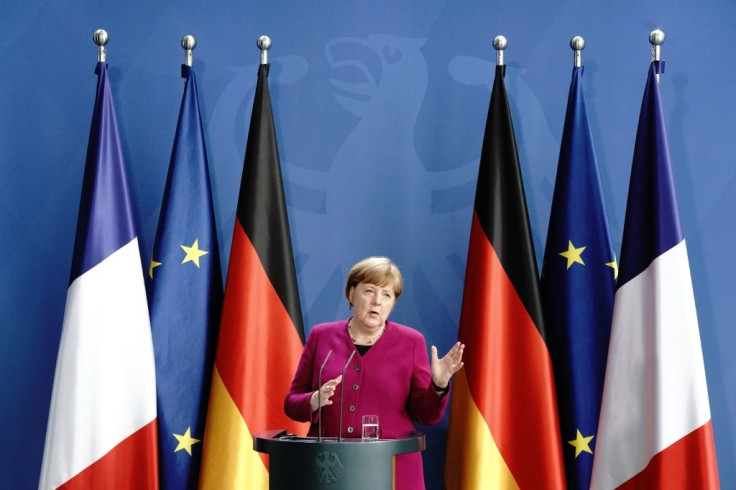Merkel, Macron Propose $545 Billion EU Recovery Fund, But Some Members Balk At Sharing Debt Burden

KEY POINTS
- Funds would be distributed as grants rather than loans
- Netherlands, Germany, Austria and Finland have firmly opposed debt burden sharing in prior crises
- Merkel had earlier dismissed the notion of European nations sharing debt
The leaders of France and Germany have jointly proposed the formation of a €500 billion ($545 billion) fund to help the hardest hit EU nations recover for the coronavirus pandemic.
German Chancellor Angela Merkel and French President Emmanuel Macron agreed that funds should be distributed as grants rather than loans.
Under this proposal, member states that receive funds would not need to repay the cash. Instead, liability for the debt would simply be added to the EU budget – member states contribute to the budget based on their size and economic prosperity. As a result, the issuance of grants would not increase the debt burden of these hard-hit countries (like Italy, Greece and Spain).
The proposal encompasses health protection, economic recovery, ecological and digital transition and industrial sovereignty.
Should the proposal pass it would mark a new chapter in burden-sharing at the EU. During previous financial crises, Netherlands, Germany, Austria and Finland have firmly opposed debt burden sharing.
“We are convinced that it is not only fair but also necessary to now make available the funds ... that we will then gradually repay through several future European budgets,” Merkel said. “When Germany and France take the initiative, then this encourages the opinion-making process in the EU. We will have to act European in order to get well out of this crisis.”
Macron said: “What is sure is that these [funds] will not be repaid by the beneficiaries … We are proposing to do real transfers [of money] ... that’s a major step.”
"I believe this is a very deep transformation and that's what the European Union and the single market needed to remain coherent," Macron said, adding that the fund was "what the eurozone needs to remain united.”
Merkel and Macron also said grants should be used to invest in a green technologies.
Merkel emphasized, however, that this recovery fund would be a “one-off effort” and that “because of the unusual nature of the crisis, we are choosing an unusual path.” Her statement suggested such measures would not be a template for future crises.
“The goal is for Europe to emerge from the crisis stronger," Merkel added.
For Merkel the venture represents a change in strategy – she had earlier dismissed the notion of European nations sharing debt. She now declared that the European Commission would borrow from the financial markets to generate money for the fund.
Macron initially wanted a much larger recovery fund -- a trillion or more euros – but backed out and compromised after conceding such a huge amount of grants would not be acceptable to Merkel or German taxpayers.
The fund idea, which must be approved by the other 25 EU member nations, received largely positive reviews from key European officials, with at least one prominent naysayer.
European Commission President Ursula von der Leyen said the proposed fund "acknowledges the scope and the size of the economic challenge that Europe faces and rightly puts the emphasis on the need to work on a solution with the European budget at its core.”
European Central Bank President Christine Lagarde called the plan "ambitious, targeted and welcome.”
Charles Michel, the president of the European council and the former prime minister of Belgium, also praised the proposal.
“This is a step in the right direction,” he said. “In order to reach an agreement, all 27 EU member states will be involved. I call all 27 member states to work in a spirit of compromise as soon as the [European commission] has tabled a proposal. Relaunching and transforming our economies impacted by the Covid-19 pandemic is key.”
Italian Prime Minister Guiseppe Conte called the proposal "an important first step in the right direction along the lines intended by Italy.”
Spain's Prime Minister Pedro Sanchez also commended the plan. “Now it's time for [the] EU to put forward a proper financial package," he said.
However, Austrian Chancellor Sebastian Kurz stated that Vienna endorsed providing loans to member nations rather than grants.
"Our position remains unchanged," Kurz tweeted. "We expect the updated [EU budget] to reflect the new priorities rather than raising the ceiling."
Kurz also suggested the proposal would be rejected by some northern EU member states, including Denmark, Netherlands and Sweden.
The Dutch government has expressed concern over bailing out member nations that did not prepare themselves for weathering the economic crisis.
BBC reported that both Macron and Merkel have much at stake with this proposed fund.
“Macron badly needs to polish his European credentials at home,” BBC wrote. “He already has an eye on his re-election bid and so far the self-styled ‘Mr. Europe's’ attempt at European reform has failed rather spectacularly to take off.”
Merkel, BBC added, is seeking to preserve her political legacy as a unifier of the EU.
A European council comprising the 27 heads of state is expected to debate the recovery fund proposal next month.
© Copyright IBTimes 2025. All rights reserved.





















